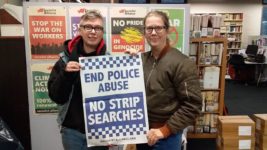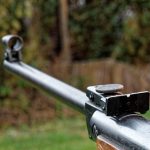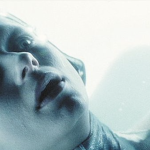NSW Police Apologise for Strip Searches: An Interview With Socialist Alliance’s Evans and Price

In early November 2017, refugees and asylum seekers being detained on Manus Island were refusing to leave the offshore detention centre the Turnbull government was in the midst of shutting down, as they feared for their safety on transfer to Lorengau transit centres.
On 10 November, pro-refugee activists Rachel Evans and Susan Price were standing in solidarity with the detainees – held on the island for years on end – as part of a protest action out the front of a fundraiser for then Liberal MP Tony Abbott.
After leaving the protest, the two women were walking down the street in Redfern, when police swooped on them, threw them in the back of a paddy wagon and drove them off to Newtown police station.
Without being told why they’d been apprehended, or what they were to be charged with, Evans and Price were taken into a police cell – one at a time – and ordered to remove their clothes, as they were being strip searched. And following this ordeal, the pair were released without charge.
Last resort becomes routine
The recently released UNSW report Rethinking Strip Searches by NSW Police outlines that over the last 12 years, police use of strip searches has increased twentyfold. In the 12 months to November 2006, 277 strip searches were conducted, whereas in the 12 months to June 2018, 5,483 were.
The UNSW report was commissioned by the Redfern Legal Centre as part of its Safe and Sound campaign. It’s pushing for an overhaul of the vague police strip search protocols set out in the Law Enforcement (Powers and Responsibilities) Act 2002 (NSW), also known as the LEPRA.
Safe and Sound was launched last December, around the same time that NSW Greens MLC David Shoebridge released figures revealing that over the four years to June 2018, NSW police strip search use had increased by 47 percent.
And in October last year, the state’s sole police oversight body, the Law Enforcement Conduct Commission (LECC) launched an investigation into NSW police use of this invasive practice, “following a number of specific complaints and anecdotal information”.
Admitting the injustice
However, in a rare admission of wrongdoing, the NSW police Inner West Area Command officially apologised to Evans and Price on 11 September this year for the “distress and embarrassment” it caused them.
And to further compensate the activists for subjecting them to a practice that’s been shown to induce trauma in or retraumatise its victims, the NSW Police Force also reached an undisclosed settlement with Evans and Price, who despite their ordeal, haven’t been deterred from protesting.
Sydney Criminal Lawyers spoke to Socialist Alliance members Evans and Price about how the strip search personally affected them, what the apology says about the conduct they were subjected to and how officers seem to have applied the strip search as a punishment for their activism.
Firstly, last week, you received an apology from the Inner West Area Command for the “distress and embarrassment” you suffered following your arrest after a November 2017 protest. How did you two come to receive the apology?
Susan Price: We basically sought advice and decided we would take action against the police over what had happened to us, mainly because we thought it was important for us to stand up for our own rights, but also to ensure that the NSW police couldn’t get away with this behaviour.
Rachel Evans: We went straight to the Redfern Legal Centre after we were strip searched. A former lawyer and activist got in contact with us and said it was a gross violation of our rights, and told us to get in touch with the centre. They advised us to ask around a few law firms to see if we had a case.
So, we went to a couple of different firms and explained what had happened. We put in a GIPA – a freedom of information request – to try and get information out of the police. Then the law firm started to give us some advice and put in some paperwork.
The police then got back to us with the apology and the settlement discussion.
So, it was quite a long process?
Rachel Evans: It took a while. The other thing that happened was there was an investigation conducted against the police by the LECC.
To ask perhaps an obvious question, why would you say the apology was warranted?
Susan Price: Because what the police did to us was wrong. It was against their own guidelines in relation to arrest and strip search. It was unwarranted. And if you read the recent UNSW report on strip searches in NSW you can see that very clearly.
The way that it happened was I was taken into a cell and told I was going to be strip searched. I was told this was part of the police duty of care. Thinking about that now, it just sounds ridiculous. But, it also makes me realise that it was seen as routine.
Rachel Evans: The legal basis for why they strip search people under the LEPRA is that they’re worried about drugs, sharps and stolen items.
But we were peacefully protesting grotesque refugee policies and there were actions happening all over the country in support of the men on Manus.
It was pretty clear we had a megaphone and some placards. There weren’t any drugs. And police know that protesters aren’t carrying drugs.
Protest organisers are conducting themselves within a framework of organising people for political action. So, the basis under which they strip searched us was faulty. And they didn’t tell us what we were being charged with when they threw us into the paddy wagon.
So, on a whole range of legal protocols within the LEPRA they erred. But, generally, being strip searched is completely undignified and humiliating. And it was a violation of our bodily dignity.
An apology was extremely warranted. But, for the poor five and a half thousand other strip search victims that the police targeted over the last financial year, we want that kind of response as well.
When you are subject to a strip search, it’s not something that you can just walk away from and forget about. What sort of aftereffects did the strip search have on you?
Susan Price: At the time, you just go into survival mode, because you want to get out of police custody as quickly as possible – that’s certainly what I did.
And then it really wasn’t until later down the track – partly because all the media around the issue, but also because of our own follow up action – that it really began to sink in how serious a violation of our civil liberties and personal rights this had been.
It certainly had a big impact on both of us. And we’re both experienced activists, who’ve been at many protests before and dealt with police presence at them.
But, it was humiliating, disempowering and it really makes me feel for the young people who have been subjected to that behaviour by police just because they’ve gone to a music festival or for vulnerable communities, like First Nations communities. And that partly kept us motivated in pursuing the matter.
Rachel Evans: I’m a member of the Rainbow community. I’m a lesbian. And I’ve been active around the Marriage Equality campaign for the thirteen years it was waged.
So, I’ve come across 78ers and I know a lot of the history and the stories of police brutality against the Rainbow community. And I’m also involved in deaths in custody campaigning with various Aboriginal families.
So, I’m very aware of the police and how brutal they can be to marginalised communities. And I’ve been protesting – as has Susan – since the early 90s, when we started protesting the Iraq war and for refugee rights.
It’s not like we didn’t know what the police are capable of. But, when the strip search happened to us, it had quite an impact on us both.
We’re quite robust. We made sure it didn’t deter us from getting back out onto the streets and fighting against various injustices. And we knew that it was important for us to speak out and we did. Since December 2017, we’ve been talking and speaking out.
We know it’s very important to work with the Redfern Legal Centre and their Safe and Sound campaign, as well as raise the demands of ending strip searches, and compensating and apologising to the victims of this police assault against marginalised communities and young people primarily.
At any time during the incident was there anything that suggested a reason behind the use of the strip search other than intimidation?
Susan Price: No. In fact, the police didn’t even pat us down at the time we were arrested, or at any time during our custody. You would think that if they were looking for a weapon or something else that would be their first recourse.
So, at first, they didn’t do that. It jumped straight into take off your clothes and squat.
As I said to the police representative, when the letter was given to us, I felt like I was a guinea pig or a subject in some training exercise. It was a bizarre situation. And it was related to us like it was just some routine operation that you should just expect when you are in custody.
The thing was, the night that this protest was happening, it was very politically charged. It was a Tony Abbott fundraiser. Peter Dutton was the keynote speaker. Earlier in the evening, it was a pretty full on protest, with guests running the gauntlet to attend this dinner.
And it did really feel like we were subject to very political policing on the night.
And lastly, what would you say the apology says about the conduct you were subject to on the night? And what sort of admission did NSW police make in issuing an apology?
Susan Price: The simple fact that they gave us the apology letter sends a pretty strong message that they know they were in the wrong. We also were very confident that we had a strong case.
The fact that an investigation was taking place and had an outcome that was very damning against a number of officers who had been involved in our arrest and strip search meant that really there was no argument from where we were standing.
Of course, the settlement process and outcome is confidential, so it’s not really something that we can discuss. But, the fact that we have this letter is quite symbolic that there was wrongdoing.
And certainly, the letter itself states that the police have taken steps to put systems in place to prevent similar occurrences from happening again.
That says to me that there was a problem. And a very serious one that had to be corrected. But, more generally than what Newtown police might have done to correct their procedures, what we are really keen to see is more reform in this area.
It’s not just a question of culture. It’s also a question of having very vague criteria or descriptions of police powers in regard to strip searches. And strip searches should be a last resort.
When police have to undertake a strip search, it shouldn’t just be the decision of the officers on duty at the time. They should have to seek external intervention to approve that kind of invasion of a person’s privacy and their body.
What they did to me in asking me to squat, could be read as an unlawful cavity search. It was a very serious breach.
And we were certainly pleased that a complaint was made that prompted an investigation by the LECC. That was very important as well in resolving the matter.
Rachel Evans: My take is that strip searches should be illegal. The government and the police should not be strip searching people. People who have been sexually assaulted or are victims of child sexual assault have an extremely negative response. It retraumatises them.
It would be very easy for the government to introduce technologies that don’t involve people in positions of power forcing people to strip in front of them. There are other things that they can do.
We should be bold about saying that this should be illegal. This is totally undignified, humiliating and an abuse of power.
We should be clear about the government and the police apologising to the victims of strip searches. And they should be putting in measures to make this technique redundant – to not strip search people in the course of police activities.
Our case is a good example. We want people to stand up against this intimidation by police. And there are a whole lot of examples from the Redfern Legal Centre in the UNSW report of police overstepping the mark and behaving abominably.
So, we want people to feel confident to stand up, speak out and then for us as a whole to campaign against this repressive wave.







